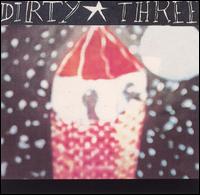| The Dirty Three's fourth venture into long-play territory is easily their most controversial, and a decided change in direction. While the band's previous recordings -- Sad & Dangerous, Dirty Three, and Horse Stories -- have all, in some way, attempted to capture the trio's live show, where slow, winding patterns and riffs become a swirling churning blast of emotional cacophony for both musicians and listeners, Ocean Songs takes a very different tack to achieve an end that is similar, but more focused. There is an aesthetic at work on Ocean Songs, from the cover through to the last note of the original recordings (early issues of the CD came with a second CD with three bonus tracks, all of which have surfaced elsewhere), the purpose of which is held in the somewhat mysterious title. The music is what makes it so. Are D3 playing songs inspired by or seemingly "created" from the ocean? Or are they paying homage to the ocean? The music here keeps all tempos reigned in and all instrumental flurries to a minimum, creating the feeling of waves lapping and pouring into and out of one another. It's as if the D3 were on a vessel, playing to the ocean itself. There are hints in guitarist Mick Turner's gorgeous cover painting, which shows a tranquil mermaid on one side, a near tidal wave over a red boat on the back sleeve, and both in deep blue against a light blue background, seemingly under the ocean. On the tentative opener, "Sirena," Warren Ellis plays two- and three-notes lines, held interminably against Turner's pastoral and minimal guitar flourishes while Jim White's rhythmic constructs glisten and shimmer through the middle, offering it all more room to drift rather than create a frame. On "Distant Shore," a tune built on three chords and a fragment, Ellis puts the album's tentative nature forth in the elegantly twisting lilt of his violin, creating a melody that is simply a chant, as Turner and White slip around his center, creating a view of the shore and the ground, mirage-like and ephemeral, and presented through a watery prism, as mournful, left behind, turned away from. The centerpiece of the album -- from which there is no return, either to "traditional" D3 form or to anything else considered rock music -- is "Authentic Celestial Music." Ellis, for the first time, overdubs his violin, creating a series of drones and overlapping melodies. Turner plays its straight, creating a chord structure that follows the dynamic changes in Ellis' minimal style, from one melody to the next, with no more than 12 notes total. White relies on his tom toms and a muted snare, almost leaving his cymbals out of the mix entirely until over halfway through the tune's nearly 11 minutes. Here is a new kind of intensity for the D3, one built in unison and not in any kind of rock counterpoint. A dynamic range is built upon slowly, with repeated phrases and rhythms masking the turbulence underneath, mirroring it even, and holding some degree of it in, where previously the dials would have been in the red. This is not to say there isn't drama or tension -- far from it. It's just that it does not get released through catharsis; instead, it merely goes quiet. When "Backwards Voyager" ushers in the second half of the album, it is clear that listeners are in the aftermath of a storm. A dangerous calm is created by White's whispering snare, and deepened by Turner's generous open-tuned chords, plucked and gently strummed, as Ellis just hovers elegaically in the background, moving the band into a lulling, shimmering space where everything floats in open, empty, poetic, and lyric space. D3 move eventually from this gorgeous, mournful, and some what sad space into the heart of beauty itself, meditating on this new terrain, one which extends far beyond anything they conceived of exploring as a band on previous albums. Loss, desire, remembrance, solitude, and the tenuous benevolence of nature are all emotional frames explored in tracks like "Last Horse on the Sand," the densely mysterious "Sky Above, Sea Below," and "Black Ride." The disc ends with "Ends of the Earth," with Ellis taking up the piano as well as his violin, and Turner playing a gorgeous yet simple lyric line that evokes the shimmering horizon, endlessly out of reach, just over the next curve in the earth. Ellis, whose chords underlie his fragile song, also layers his violin just above White's brushed snare that haunts Turner's guitar. In the middle of the tune's five-minute span, one can see into the depths of the ocean itself, and hear it speak its secret truths while revealing its hidden, flowing body. It's a song than ends in a small, shimmering whisper about things to come, things that are, and things that will never be. On Ocean Songs, the Dirty Three have expanded themselves immeasurably as a band by holding themselves in to listen, and have made some of the most haunting, poetically profound, and emotionally honest music ever to come out of the "rock" world. (AMG) / Pitchfork |
|















 Contacta:
Si tienes algo que comentar, preguntar o quieres colaborar envía un correo a andtheworldsmileswithyou@gmail.com
Contacta:
Si tienes algo que comentar, preguntar o quieres colaborar envía un correo a andtheworldsmileswithyou@gmail.com
No hay comentarios:
Publicar un comentario